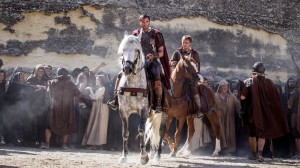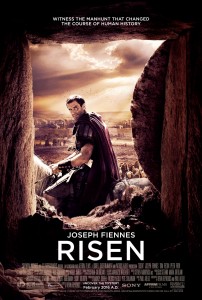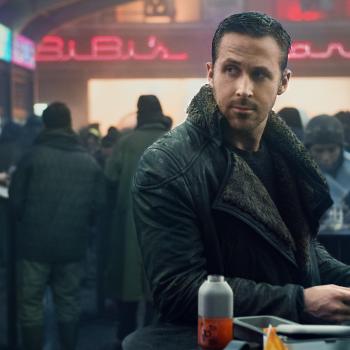“Risen” isn’t a movie that will change the world. It’s not going to take home an Oscar. It isn’t likely to win over skeptics or make much of a dent outside the community of people who already believe its story. But those who want to see their faith portrayed on screen with some sincerity and imagination could do worse.
It’s not much of a pull quote, but it’s high praise in a world of wretched faith-based dramas like “War Room” and “God’s Not Dead.” Competently directed by Kevin Reynolds and featuring a strong lead performance from Joseph Fiennes, it’s an often affecting look at the story of Christ’s resurrection, told from an interesting point of view.
Fiennes is Clavius, a Roman soldier serving in Judea as right-hand man to Pontius Pilate. He works crowd control on Good Friday, arriving on the scene shortly after Jesus (Cliff Curtis) has breathed his last. He supervises the burial and sealing of the tomb, and is brought in to investigate when the Nazarene’s body goes missing three days later. Initially annoyed at being dragged into what he sees as just another Jewish squabble, Clavius soon becomes baffled by the lack of a body and the strange attitudes of Jesus’ followers.
“Risen” presents itself as a mystery, a Judean noir. But there’s no secret where it’s heading. This isn’t a “DaVinci Code” pot-stirrer meant to incite controversy or suggest an alternate reading to the gospel story. At the end of the day, it’s another Jesus movie, told from a different angle. It’s sincere, kind of clumsy and a bit on the nose, seeking not deep theological exploration but simply a retelling of a familiar story with a slight twist.
That’s actually more refreshing than you might suspect. As I said in my introduction to this year’s Lent project, I don’t need another straight Easter pageant. And while “Risen” hits familiar beats for the Sunday School crowd, it presents a unique perspective on the Christ story. We enter after the crucifixion has occurred; Clavius just wants to make Pilate happy and keep moving up the ladder. The film brings in familiar people like Mary Magdalene or the disciple Bartholemew as the investigation continues, but there were only a few times where I felt like the movie was trying to nudge me in the ribs and say “hey, remember this guy? From church?”

The film largely avoids turning itself into an apologetic lesson. When figures from the gospel accounts show up, their presence serves more to baffle Clavius than explain much of what’s going on. I appreciated Mary Magdalene’s silent disbelief and Bartholemew’s goofy enthusiasm. The film reminds us that the gospel was spread not through force or long-winded arguments but through changed lives and passionate followers. Clavius searches for ways to explain away what he’s seeing, but he’s rattled by the people who have been around Jesus, who carry themselves with a new peace and joy. It’s a refreshing change of pace from movies where Christians portray themselves as suffering underdogs or soldiers of righteousness.
Fiennes brings a quiet intelligence to the role. I imagine it would be easy to make Clavius a man who rails in anger at the Jews, only to have a life-changing transformation that pits him against the Roman Empire. The film, thankfully, goes in a more thoughtful direction. Fiennes plays Clavius as a man annoyed to be spending time in Judea, but not especially hot-tempered or brutal. His only motive in finding Jesus’ body is to wrap the case up, make Pilate happy and continue ascending the ladder to Rome. He’s a skeptic, but not a persecutor. I like that the film allows Clavius’ journey of faith to be just that; by the film’s end, he’s changed, but not necessarily a believer. Fiennes plays the degrees of change very well, and suggests the internal struggle the normally rational guard is facing, capturing the slow progression of faith in the impossible.
Director Kevin Reynolds had a brief moment of fame in the early 90s with the commercial success of “Robin Hood: Prince of Thieves,” but he squandered it fairly quickly with the notorious fiasco of “Waterworld.” He’s since stuck to lower-budget historical dramas and television movies. “Risen” is on par with those; there’s nothing too epic about it, but the film looks handsome and Reynolds captures the starkness of Judea and the brutality of the Roman empire fairly well. The film’s first half is a biblical procedural, and the director keeps it moving fairly quickly. There are a few clumsy moments here and there, but the film largely never gets too preachy, keeping its focus on Clavius and his personal story. Reynolds also finds some moments of true wonder, including a crucial scene where Clavius encounters something that leaves his stupified; in the wrong hands, the moment could have been cheesy, but the director and cast play it well and let it be a truly moving moment.
In the film’s back half, Clavius’ story dovetails more directly with the biblical narrative, as he spends extended time with the disciples. Here is where nonbelievers may find the film cloying, but I appreciated the way Reynolds weaves his story into the gospel accounts. The portrayal of the disciples might be a tad too cutesy at times, but I found their joy and camaraderie exciting. Most films of the Christ story understandably center around the crucifixion, with maybe a quick scene featuring the Resurrection; we have a lot of Good Friday movies, but not a lot of Easter ones. As a result, the disciples are often portrayed as impetuous, scared and fractured. We rarely get to see stories centered on their response to the resurrection and the strange hope and excitement that must have invigorated them. As Clavius spends time with them, particularly Peter (Stewart Scudamore), the film takes on a loose tone that’s rare for biblical movies, and the kindness and love shown among Christ’s followers is powerful. I also found Cliff Curtis’ brief appearances as Jesus to be a wonderful interpretation. In addition to it being the rare film to actually feature a Middle Eastern Christ, “Risen” also presents a Jesus who speaks softly, smiles warmly and genuinely seems happy to see his friends. There’s a humanity to the movie that undercuts the occasional clumsiness and makes its depiction of the gospel story like proselytizing and more like telling a familiar, beloved story.
Again, it’s not perfect. I could have done without the manufactured subplot giving Clavius a conflict with an apprentice (Tom Felton), and the film’s final moments feel a bit too saccharine. But as someone who cherishes the gospel story, I appreciated “Risen’s” clever telling of the story and its warm, human approach to the characters. It’s not going to change the world, but “Risen” is proof that there is still cinematic life in the greatest story ever told.













